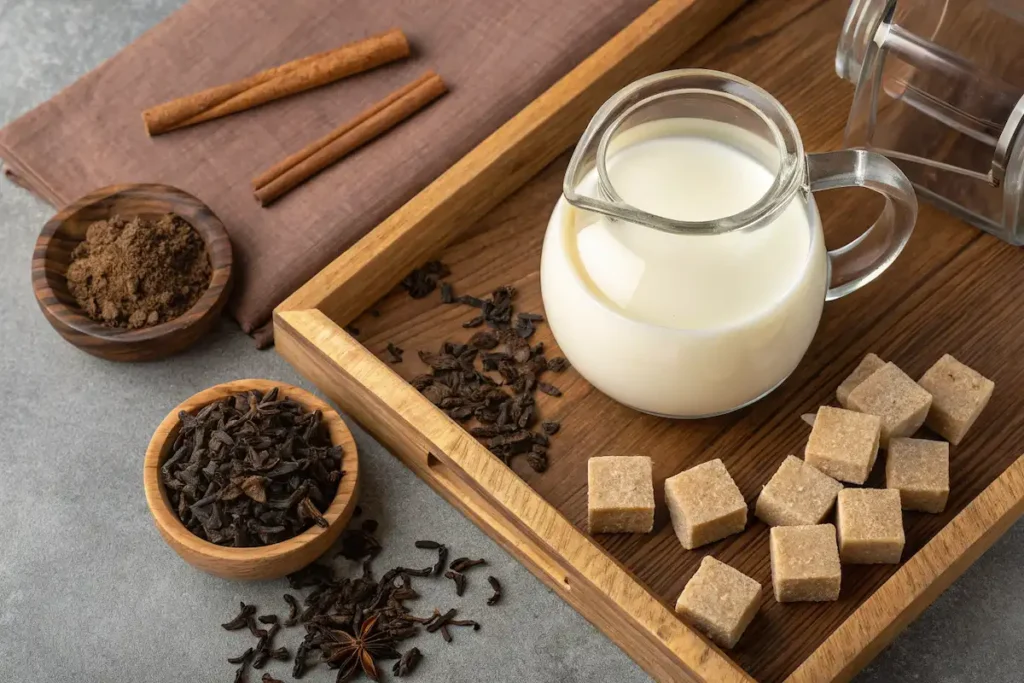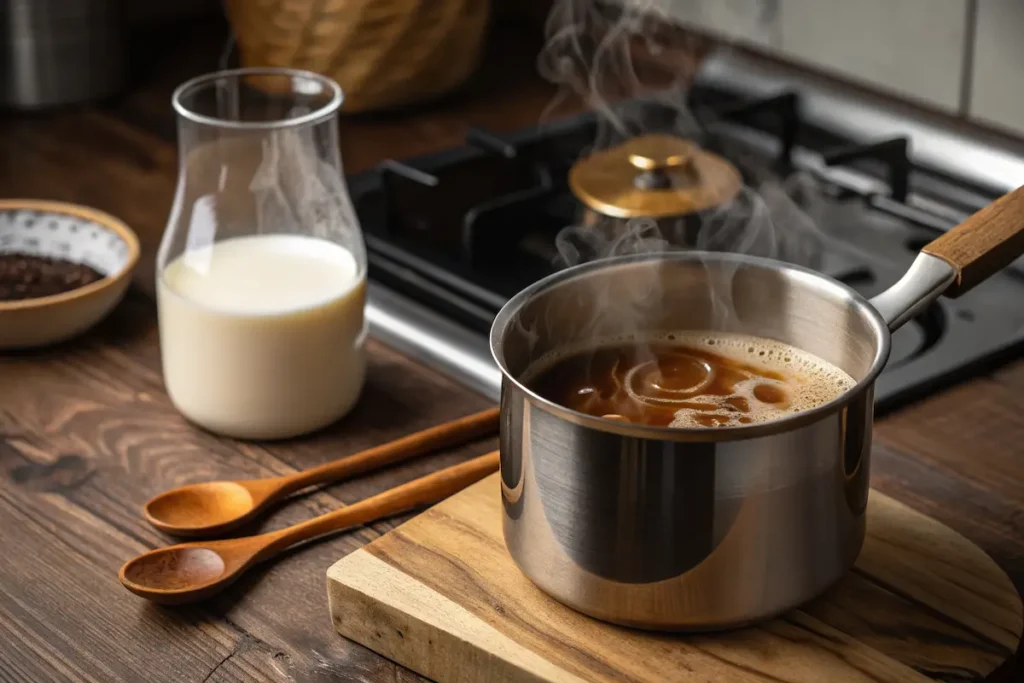There’s something magical about sitting near a window, wrapped in a shawl, listening to the soft rhythm of rain while holding a warm cup of Assam tea with milk. For me, it brings back vivid memories of mornings at my grandmother’s house in the countryside. She would wake up early, long before anyone else, and the first thing she did was put the kettle on. The smell of strong black tea boiling with full-fat milk would drift through the home, drawing us to the kitchen like moths to a flame.
My grandmother always said, “Assam tea is strong like the rain—it wakes you up and comforts you at the same time.” She was right. The bold, malty flavor of Assam tea is perfectly balanced by the richness of milk, making each sip deeply satisfying.
In this article, we’ll explore how to make Assam tea with milk the right way—just like she did. You’ll learn why Assam tea is ideal for milk tea, how to brew it without bitterness, the role of milk in softening the flavor, and how this simple ritual can transform your mornings. We’ll also answer your most common questions and share real serving ideas.
Table of Contents
Assam Tea with Milk: A Strong and Creamy Tradition from My Grandmother’s Kitchen
A warm and comforting blend of strong, malty Assam tea simmered gently with creamy milk. Perfect for rainy mornings or slow starts.
- Prep Time: 2 minutes
- Cook Time: 8 minutes
- Total Time: 10 minutes
- Yield: 1 cup 1x
- Category: Beverage
- Method: Stovetop
- Cuisine: Indian
Ingredients
- 1 teaspoon loose-leaf Assam tea
- 1 cup water
- 3/4 cup full-fat milk (or preferred alternative)
- Sweetener to taste (optional)
Instructions
- Bring 1 cup of water to a boil in a small saucepan.
- Add 1 teaspoon of loose-leaf Assam tea.
- Let it simmer gently for 3–4 minutes until deep amber in color.
- Add 3/4 cup of full-fat milk to the pan.
- Simmer again for another 3–4 minutes until rich and creamy brown.
- Strain the tea into a cup.
- Sweeten if desired and enjoy warm.
Notes
Adjust the tea-to-milk ratio to your liking. For a stronger brew, use more tea leaves or simmer longer. Try oat or almond milk for a dairy-free twist.
Nutrition
- Serving Size: 1 cup
- Calories: 100
- Sugar: 6g
- Sodium: 45mg
- Fat: 5g
- Saturated Fat: 3g
- Unsaturated Fat: 2g
- Trans Fat: 0g
- Carbohydrates: 8g
- Fiber: 0g
- Protein: 4g
- Cholesterol: 15mg

Why Assam Tea with Milk Feels Like Home
The Malty Strength of Assam Tea
Assam tea is known for its bold flavor and strong body, which comes from the rich soil and tropical climate of Assam, India. Its full-bodied character makes it one of the few black teas that pairs well with milk. That’s why it’s the base for many masala chai blends and milk teas. When combined with creamy whole milk, it doesn’t fade—it transforms.
If you’ve ever made masala chai, you already know how Assam stands up to milk and spice. But even without spices, a simple Assam tea with milk has enough depth to satisfy. Unlike more delicate teas like green or jasmine, Assam thrives when steeped strong and slow. For other milk tea lovers, this flavor is richer than what you’d find in drinks like rose milk tea or matcha milk tea, which are lighter and sweeter.
The Comfort Milk Brings to a Rainy Morning
Milk plays a bigger role than just diluting tea. The fats and proteins in milk bond with tannins in black tea, smoothing out the rough edges and mellowing the flavor. Assam tea’s natural astringency becomes rounded and warming when simmered with milk. It’s not just about taste—it’s about comfort.
Full-fat milk works best for traditional preparation, but many now enjoy it with alternatives like oat or almond milk. If you prefer a modern variation, try it chilled with a touch of sweetener, similar to how taro milk tea is served cold. Or for a deeper, bolder blend, explore the sweetened twist of black tea milk and honey, which combines Assam’s strength with honey’s warmth.
Preparing Assam Tea with Milk the Traditional Way
How to Brew Assam Tea Without Bitterness
If you’ve ever had milk tea that tasted too bitter or too weak, it’s likely due to incorrect brewing. Assam tea needs both time and heat, but not oversteeping. Here’s how my grandmother did it—and how I still do it today.
Start by boiling 1 cup of water with 1 heaping teaspoon of loose-leaf Assam tea. Let it simmer gently for 3 to 4 minutes until it becomes deep amber. Then, add ¾ cup of full-fat milk and simmer again for another 3 to 4 minutes. The color should turn rich and creamy brown, and the aroma? Unforgettable.
This method releases the full malty flavor without over-extracting the tannins that cause bitterness. Strain into your favorite cup and sweeten if desired. You can also follow the steps outlined in our detailed recipe for assam milk tea if you’re more visual.
Prefer it with a floral twist? You can experiment using techniques from our earl grey tea milk guide—just substitute the tea and keep the same milk process.
Getting the Right Tea-to-Milk Ratio
This is where things get personal. Some prefer it heavier on tea, others lean into the creaminess. For a balanced cup, I recommend a 4:3 water-to-milk ratio, plus 1 teaspoon of tea per cup.
Here’s a quick reference:| Water | Milk | Tea |
|---|---|---|
| 1 cup | ¾ cup | 1 tsp loose Assam |
Once you find your favorite ratio, it becomes a comforting ritual. For days when you want something stronger, go heavier on the leaves like we do in black tea honey milk or use condensed milk for a sweeter profile inspired by ube milk tea.

Health Benefits of Assam Tea with Milk
A Natural Energy Boost Without the Crash
Assam tea is naturally high in caffeine and the amino acid L-theanine, which gives you a clean boost of mental focus without the jittery effects of coffee. When combined with milk, that energy release becomes even smoother—ideal for mornings when you need clarity but also comfort.
It’s no surprise that many people swap their morning latte for Assam tea with milk. It offers a more grounded experience, especially when taken warm. The balance of caffeine and fats from milk can help you stay energized for hours, without the midday crash.
If you’re watching your calorie intake, though, it’s important to consider the milk content. A cup of classic Assam milk tea has around 90–120 calories. You can find a full breakdown of milk tea variations in our milk tea calories guide or compare it to the richer blends like bubble milk tea, which are often loaded with sugar.
Gentle on the Stomach and Good for Digestion
Assam tea contains tannins, which help stimulate the digestive process. When combined with warm milk, it can soothe the stomach—especially after a heavy meal or during stressful days. That’s why, in Indian tradition, tea is often served after meals or in the late afternoon.
For those sensitive to strong black teas, milk acts as a buffer, reducing potential irritation while preserving the bold taste. If you’re comparing it to other blends like genmaicha milk tea, which is gentler, you’ll find that Assam offers more punch without the acidity of coffee.
Looking for something even more calming? The floral profile of lavender milk tea might suit evening routines better, while Assam remains perfect for kickstarting your day.
Making Assam Tea with Milk Part of Your Everyday Ritual
When to Drink It and How to Enjoy It Best
Assam tea with milk isn’t just a drink—it’s a pause, a ritual, a comfort. Many people enjoy it first thing in the morning, as a gentler yet energizing alternative to coffee. Others prefer it in the afternoon, as a calming mid-day break. The malty warmth and milky texture also make it perfect for rainy weekends or slow Sunday mornings.
It pairs beautifully with light snacks like toast, buttery biscuits, or savory bites. If you’re into Japanese-style pairings, it also complements light sweets like bento cakes or mini bento cakes thanks to its robustness.
For a spiced twist, you can adapt it using elements from masala chai: a pinch of crushed cardamom, clove, or cinnamon. But the charm of plain Assam tea with milk is its simplicity—it doesn’t need embellishment to shine.
Modern Variations to Try at Home
If you’re feeling adventurous, cold brew Assam milk tea is gaining popularity. Steep the tea overnight in cold water, then add chilled milk and sweetener for a smoother, less tannic version perfect for summer. You can also use non-dairy milk like coconut or almond if you’re experimenting with textures, much like what’s done in coconut milk green tea recipes.
For those who like their tea a bit more indulgent, turn your Assam milk tea into a dessert-like treat by whipping in cream or condensed milk—similar to the richness found in strawberry milk tea boba.
Assam’s bold base makes it endlessly adaptable. Whether served hot in winter or cold in summer, it retains its soul: deep, earthy, and comforting.
FAQ: Assam Tea with Milk
Can you put milk in Assam tea?
Absolutely. Assam tea is one of the best black teas to pair with milk. Its bold, malty flavor holds up beautifully against the richness of dairy or plant-based alternatives. Whether you’re making it strong and hot or turning it into a cold milk tea, Assam won’t lose its character.
Is Assam good with milk?
Yes, Assam tea is exceptionally good with milk. In fact, it’s one of the most popular bases for Indian-style chai due to its strength. The tannins in Assam blend well with the fats in milk, creating a smooth, balanced drink that’s comforting and rich.
Is Assam tea good for milk tea?
Definitely. Assam is one of the top choices for milk tea recipes around the world. Its robustness stands out in both traditional hot milk teas and modern bubble tea versions. For example, it works wonderfully in drinks like tiger milk tea or even okinawa milk tea.
Is Assam tea made with milk or lemon?
Traditionally, Assam tea is enjoyed with milk—especially in India. However, it can also be served with lemon if you prefer it black. But never both at the same time, as lemon will cause the milk to curdle. For the classic experience, go with warm, creamy milk.
Conclusion
Assam tea with milk isn’t just a beverage—it’s a feeling. A warm memory. A pause in a chaotic day. Whether you grew up with the scent of chai simmering on a stovetop, or you’re just now discovering the comfort of strong tea softened by milk, this drink offers something deeply grounding.
Its full-bodied flavor, versatility, and emotional warmth make it more than a morning drink—it becomes a ritual. From traditional stovetop methods to modern cold brew spins, Assam tea with milk adapts without ever losing its bold soul. So next time the rain falls, or you need a comforting moment, you know what to brew.


